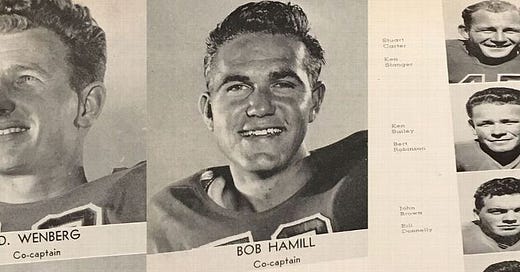San Jose Football player delivers baby.
Seven Spartans stay in Hawaii to join Honolulu Police Department.
On December 7, 1941, both the Willamette and San Jose State football teams were in Hawaii. Willamette was to face the University of Hawaii on December 6.
The next Sunday, the University of Hawaii was slated to play San Jose State, and on the 16th, Willamette and San Jose were scheduled to clash.
After that, the teams had a week of sightseeing planned, then they’d return to the the mainland on December 19.
San Jose football team leaving for Hawaii aboard the S.S. Lurline, November 1941.
On Dec. 6, Willamette faced Hawaii. Hawaii won the game 20-6. But none of the other games happened.
On Sunday, December 7, 1941, the visiting mainland teams were lined up in front of the Moana Hotel ready to board buses to take them on a sightseeing trip. They never boarded the bus, they stood on the sidewalk and watched Japanese planes fly in over Honolulu.
The next day, Martial Law was declared. All communication between Hawaii and the mainland was blocked, so players’ families had no idea if their loved ones were safe.
The coaches of both teams quickly volunteered their players to help in the war effort. The Willamette team was assigned to guard an ammunitions supply station at Punahou, and some San Jose Spartans were recruited to help the Honolulu Police Department.
Other San Jose players were tasked with stringing barbed wire; they dug trenches and manned firing positions on Waikiki Beach shoulder-to-shoulder with active-duty soldiers. One San Jose player who was assigned to put blue cellophane over car headlights, ended up helping deliver a baby.
When the Willamette coach negotiated the opportunity for the teams to go home, seven of the San Jose players decided to remain in Honolulu and join the police force. (Coach Keene of the Willamette team, would not allow any player to remain in Hawaii.)
The teams were given clearance to leave the island, and on December 19th, they boarded the SS President Coolidge. A Navy destroyer and a cruiser escorted the Coolidge to protect the ship from Japanese submarine attacks.
While on board ship, each player was assigned one wounded military man to take care of.
On Christmas Day, 1941, the Coolidge arrived in San Francisco. One cheerleader remembers both teams lining the rails singing, “California Here We Come.”
If you enjoy reading stories about World War 2 Hawaii, my husband (a retired USMC Lieutenant Colonel) and I wrote a pictorial history you may be interested in reading:







I bet the parents of the Willamette team thanked Coach Keene for bringing their boys back! Those who stayed we’re incredibly brave!